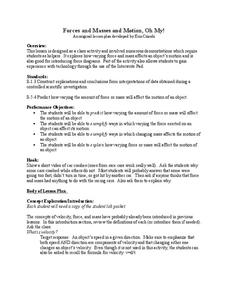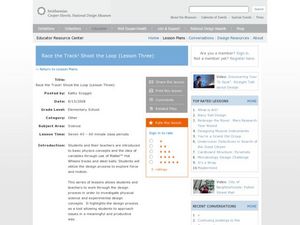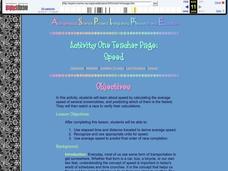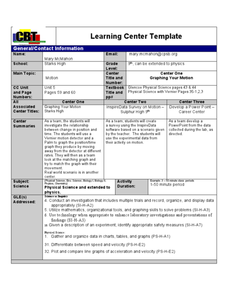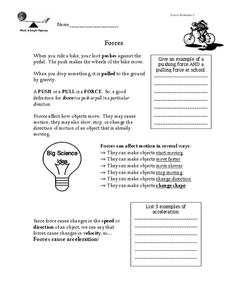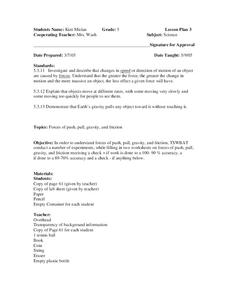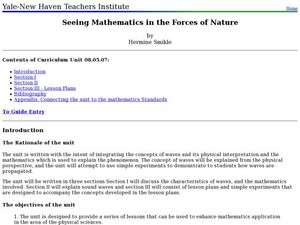Curated OER
Newton's Laws of Motion
Ninth graders utilize Newton's Laws of Motion to explain how things move, create poster illustrating each law of motion, and present and explain their poster to classmates.
Curated OER
Newton's Second Law of Motion with Simple Machines
First graders study Newton's Second Law of Motion before demonstrating the concept with a simple machine. They sing a song about speed, force, mass, and acceleration. They use simple machines to demonstrate how objects that have a higher...
Curated OER
Forces and Masses and Motion, Oh My!
Learners explore how varying force and mass effect the motion of an object. In this motion lesson students participate in a class activity and demonstrations.
Curated OER
Race the Track! Shoot the Loop
Students experiment with a steel ball and matchbox car to find the effects of force and motion. In this force and motion lesson plan, students assemble a track, conduct experiments and record on a shoot the loop worksheet. Students...
Curated OER
Race the Track! Design Challenge
Students focus on a force and motion problem, explore it, reflect on it and apply it while completing experiments. In this motion lesson, students experiment with force and motion by creating a track for testing cars.
Curated OER
Investigating Newton's Second Law Of Motion
Students participate in a lesson plan that investigates Newton's Second Law of Motion. They conduct an experiment of observing balls that are rolled down a ramp. The lesson plan includes background information for the teacher for...
Curated OER
Speed
Students explore speed by calculating the average speed of several snowmobiles, and predicting which of them is the fastest. They watch a race to verify their calculations.
Curated OER
Lesson 3: Acceleration and Force
A nine-page physics resource supports your lesson on acceleration. A step-by-step lesson plan walks you through the materials you need, the background information, steps for leading experimentation, and the explanation of the results....
Curated OER
Forces and Motion -- The Downhill Racer
Students examine the movement of a car on an inclined plane and on a flat surface. Using the amount of drops the car releases, they determine if it was traveling at a constant speed or not. They graph the velocity and acceleration rates...
Curated OER
"Graphing Your Motion"
Students study the concepts of motion, velocity, and acceleration through graphing their own movement using LoggerPro. They explain the difference between speed and velocity using the weather vane example. They discover the difference...
Curated OER
Projectile Motion
Learners observe projectile motion and calculate the speed of a baseball based on the time and distance traveled. They record the time, measure the distance, and draw the path of the ball's travel on a data table.
Curated OER
Forces
In this forces worksheet, students read about force and acceleration. They complete a Venn Diagram to compare and contrast balanced and unbalanced forces, they answer questions about a diagram of a tug-a-war and the forces acting on each...
Curated OER
Forces
In this forces worksheet, students read about what affects the force on an object. Students identify push forces and pull forces in 5 diagrams. They answer 13 questions about the forces in two diagrams and they draw vector diagrams to...
Curated OER
Acceleration, Drag, Gravity, Motion, Forces, and Friction
Eighth graders build and run mousetrap cars in order to measure distance, time, and mass for their cars. They use these measurements to calculate average speed and kinetic energy, then create a slide show to visually explain how the car...
Curated OER
Motion
Sixth graders read about and study motion. They conduct a lab in which they calculate speed using track records at their school. They graph the results and then invite a guest speaker (an officer from the local police department) who...
Curated OER
"Measurement in Motion"
Ninth graders examine the rate of motion and changes in motion using a ramp and a rolling object. They conduct the demonstration, determine the average speed, and describe how a moving object can have zero acceleration and deceleration.
Curated OER
Force
Fifth graders move a variety of objects in different ways to observe the different forces. In this physics lesson, 5th graders observe pushing, pulling, gravity, and friction. The hands-on component, and teamwork involved, should make...
Curated OER
Projectile Motion Demonstration
Students dicusss Newton's First Law of Motion. They calculate a projectile moving horizontally and vertically at different intervals. They particpate in an experiment in which the projectile is at an angle. They record and discuss the...
Curated OER
Seeing Mathematics in the Forces of Nature
Students study waves and their characteristics. In this wave activity students calculate the speed of waves, wavelength and the period.
Curated OER
Motion in the Ocean
How does the formation of currents and waves in the ocean happen? High schoolers will learn about the primary causes for ocean currents and waves by calculating a wave's amplitude and nautical mile speed. Then they will complete a...
Curated OER
Motions and Forces
Students explore motions, forces and magnetism. They investigate magnetism as a force and examine the construction of a magnet. Students examine the force that magnetism produces.
Curated OER
Describing the Motion of a Battery Powered Cars
Learners explore distance a toy car travels by changing the amount of batteries used to power the toy car. In this force and motion lesson, students calculate the average speed of a car while investigating the power from various...
Curated OER
Exploring Force and Motion
Young scholars explore the concepts of force and motion by creating a video. In this physics lesson, students are assigned one particular aspect of force and motion to investigate and work in groups to create a video that will be...
Curated OER
Newton's Second Law of Motion with Balance Toys
Students discuss acceleration and deceleration and participate in brief demonstrations of the Second Law of Motion. They apply the law to a metal balance toy and a plastic balance toy by applying the same force then with different forces.


